Top 5 Natural Ingredients for Homemade Hair Protein Masks
- Natural therapies are making a big comeback in a world where pollution, heat style, and chemical treatments frequently harm hair health.
- Homemade Hair Protein Masks, particularly those created at home with natural ingredients, are one of the best ways to revitalize dull or damaged hair.
- These give hair much-needed hydration, sheen, and softness in addition to strengthening it.
- Here are five of the greatest natural ingredients for protein-rich DIY hair masks, supported by both conventional wisdom and contemporary findings.
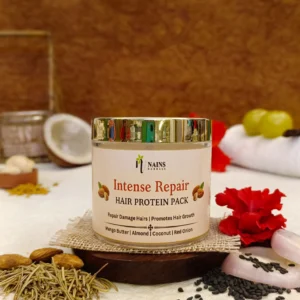
1. Yogurt – Deep Conditioner with Natural Proteins
- Yogurt isn’t just a nutritious snack—it’s a powerful natural conditioner that has been used for centuries to nourish hair and scalp.
- Packed with essential nutrients like protein, calcium, and lactic acid, yogurt is one of the most effective and accessible ingredients for DIY protein hair masks.
- It offers a perfect balance of hydration, nutrition, and scalp care, making it ideal for people with dry, dull, or damaged hair.
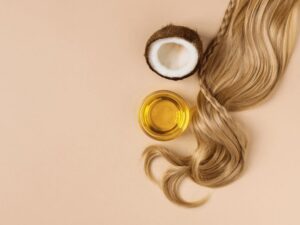
- In Ayurvedic and natural beauty regimens, yogurt has long been a mainstay, particularly for hair care.
- Because yogurt contains both proteins and lactic acid, which gently exfoliates and nourishes the scalp, experts in holistic wellness and trichology—the scientific study of hair and scalp—suggest using it as a deep conditioner.
- The environment that yogurt gives the scalp is free of dandruff and accumulation, which are common things that prevent good hair growth.
- Yogurt’s protein concentration reduces breakage and broken ends by strengthening the hair shaft from root to tip.
- It helps heal damage from chemical treatments, excessive heat styling, and environmental exposure by supporting your hair’s natural keratin structure.
- After just a few applications, many people who use yogurt into their hair care regimens observe noticeable improvements.
- Improved shine, less frizz, and softer hair texture are typical results.
- To increase its effects and customize the mask to their unique hair demands, users frequently combine yogurt with honey, olive oil, or egg.
- For added hydration, a person with dry hair can combine yogurt with a spoonful of honey.
- To regulate oil production and yet reap the benefits of deep conditioning, people with oily scalps should mix it with lemon juice.
- The cooling properties of yogurt also help soothe irritated or itchy scalps.
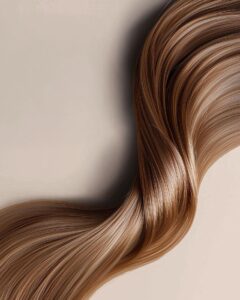
- The advantages of protein and lactic acid for hair health have been demonstrated by scientific research.
- Yogurt’s inherent lactic acid promotes better absorption of other nutrients and aids in the removal of dead skin cells from the scalp.
- Homemade Hair Protein Masks, Strong and healthy hair development depends on a healthier scalp environment, which is what it fosters.
- Additionally, the casein and whey proteins in yogurt aid in restoring the protein lost in hair strands due to pollution, UV radiation, and mechanical stress (such as brushing or style).
- These characteristics make yogurt an effective component for preserving hair structure and increasing suppleness, according to dermatologists and hair care specialists.
- For practically all hair types, yogurt is a natural and safe substance.
- It is mild enough to be used once a week and contains no dangerous ingredients.
- Yogurt offers a safe, chemical-free substitute for synthetic conditioners, which may contain sulfates, silicones, and parabens.
- It is a popular option for people who favor natural, eco-friendly, and reasonably priced hair care products because it is also readily accessible and reasonably priced.
- Yogurt-based hair masks are a reliable choice, especially for people with sensitive scalps, because they have no negative effects when applied externally.
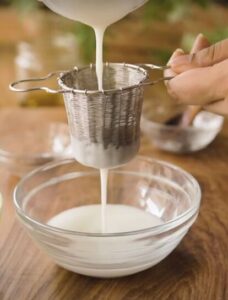
- How to Apply It
- To make a basic yogurt hair mask that is high in protein:
- Grab half a cup of unsweetened, plain yogurt.
- Add one tablespoon of honey or olive oil, if desired.
- Apply from roots to ends after thoroughly mixing.
- Let it sit for twenty to thirty minutes.
- Rinse well with lukewarm water, then use a gentle shampoo.
2. Avocado – Rich in Amino Acids & Healthy Fats
- Avocados are a superfood for your hair in addition to being a favorite on your morning toast.
- Packed with important fatty acids, amino acids, and a potent blend of vitamins and minerals, this creamy green fruit can turn dry, brittle hair into elastic, lustrous, and strong hair.
- Avocado restores damaged hair and provides deep nourishment from root to tip when used as a natural protein mask.
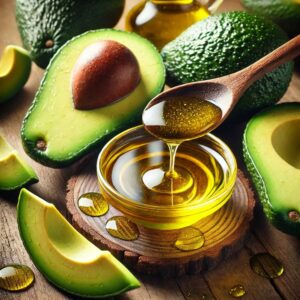
- Avocados have long been used to treat damaged hair, from ancient Aztec customs to contemporary do-it-yourself beauty regimens.
- Their makeup is what makes them so effective: healthy fats profoundly hydrate and smooth each strand of hair, while amino acids, the building blocks of proteins, aid in the reconstruction of damaged hair strands.
- This all-natural mixture lessens breakage and improves the hair shaft’s structural integrity.
- Both nutritionists and hair care specialists are aware of the benefits of using avocados topically and in the diet.
- When applied straight to the hair, they provide a potent deep conditioning therapy that is particularly advantageous for hair that has been chemically treated, heat-damaged, or is naturally dry.
- The benefits of avocados for hair health are supported by science.
- Vitamin E, an antioxidant that increases scalp circulation and stimulates development, is abundant in avocados. Additionally, they include biotin, a B-vitamin that is proven to promote the texture and structure of hair.
- Avocados are better at penetrating the hair shaft than many commercial conditioners because they contain oleic acid, a monounsaturated fatty acid.
- By forming a protective barrier surrounding the hair strand and moisturizing the scalp, these fatty acids lessen environmental damage and protein loss.
- Avocado is advised by dermatologists and natural hair care specialists for those who suffer from dryness, breakage, or dullness of the scalp—conditions that are frequently brought on by inadequate nutrition.
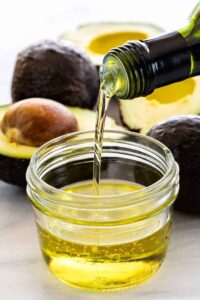
- For all hair types, avocado is a safe, chemical-free substance. It is perfect for sensitive scalps and those looking for environmentally responsible beauty products because it doesn’t include harsh preservatives or artificial substances. When used topically, the likelihood of adverse responses is low because it is a complete food product.
- Because of its great effectiveness and few negative effects, it is frequently used by fans of natural beauty and is advised in clean beauty forums. Better still, it’s accessible, reasonably priced, and adaptable.
- How to Apply It:
- Making a basic avocado hair mask:
- Smoothly mash one ripe avocado.
- Pour in one tablespoon of coconut or olive oil.
- Apply evenly from the roots to the ends of clean, moist hair.
- For 20 to 30 minutes, leave it on.
- Gently rinse with lukewarm water and apply shampoo.
3. Coconut Milk – Lightweight Yet Nutrient-Rich
- Though its more well-known sibling, coconut oil, frequently takes center stage when it comes to natural hair care, coconut milk is also a powerful source of nutrients for your hair.
- One of the best natural ingredients for promoting hair development and strengthening hair is coconut milk, which is made from the flesh of mature coconuts and is high in lauric acid, vital proteins, and vitamins B1, B3, B5, B6, C, and E.
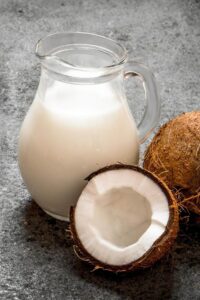
- Ayurvedic and tropical hair care traditions commend coconut milk for its capacity to strengthen hair roots, nourish the scalp, and enhance hair texture.
- Lauric acid, a medium-chain fatty acid with the unusual capacity to enter deeply into the hair shaft and form a link with the natural proteins in your hair while minimizing protein loss, is what gives it its exceptional efficacy.
- Furthermore, the natural proteins included in coconut milk help to strengthen and prevent hair loss by repairing damaged or weak hair follicles.
- It is advised for people who are experiencing thinning, hair breakage, or a loss of natural luster by both dietitians and hair care specialists.
- Coconut milk is frequently described as a mild yet incredibly nourishing treatment by those who use it frequently in their hair care regimen.
- It is appropriate for all hair types, including fine or oily hair, because it doesn’t weigh hair down like heavy oils or creams do.
- After multiple usage, users frequently claim changes like decreased breakage, shinier strands, and substantially faster hair growth.
- Coconut milk’s calming and cooling properties also aid in lowering inflammation, dandruff, and scalp irritation, fostering the growth of healthy hair.
- Using coconut milk as a pre-shampoo therapy or combining it with other natural substances like honey, aloe vera, or even fenugreek powder to enhance its effects is a common application strategy.
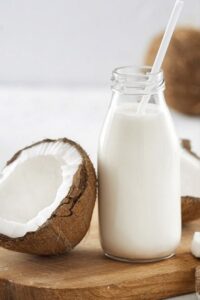
- A natural, chemical-free, and healthy substance, coconut milk has no negative effects when consumed once a week.
- It works well with all hair types, even those with sensitive scalps, and is frequently found in vegan and clean beauty products.
- It’s a reliable option for anyone looking for a softer, more natural hair care option because it doesn’t include parabens, sulfates, or artificial chemicals.
- It is a popular option for lovers of natural beauty all over the world because to its accessibility and affordability.
- How to Make a Coconut Milk Hair Mask with It:
- Take half a cup of organic coconut milk, either fresh or in a can.
- For added hydration, you can optionally add 1 tablespoon of honey or olive oil.
- Apply to hair ends and massage into the scalp.
- For 20 to 30 minutes, leave it on.
- Rinse well with lukewarm water, then use a gentle shampoo.
4. Fenugreek Seeds – Ayurvedic Protein Powerhouse
- For decades, methi dana, another name for fenugreek seeds, has been a mainstay of Ayurvedic hair treatment.
- More than just a spice, these small golden seeds are a natural protein-rich cure that strengthens and revitalizes lifeless, dull hair.
- They are also packed with lecithin, iron, and other vitamins.
- They are among the most dependable components in both conventional and contemporary hair care regimens because of their capacity to restore hair structure, lessen hair loss, and improve natural shine.
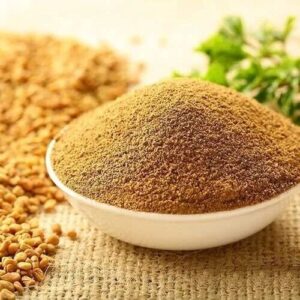
- People who regularly use fenugreek-containing hair masks commonly report measurable improvements in the strength and texture of their hair within a few weeks. Typical benefits include:
- reduction in hair loss
- a noticeable decrease in dandruff flakes
- Softer, more voluminous hair
- By smoothing the cuticles of your hair, fenugreek also acts as a natural conditioner, minimizing frizz and tangling. The result is a shiny, smooth look without the need for chemical-heavy treatments.
- Do-it-yourselfers frequently soak fenugreek seeds overnight, grind them into a paste, and combine them with yogurt, coconut milk, or aloe vera gel for a protein-rich treatment. When applied once a week, this mask helps to increase the density and gloss of hair.
- According to scientific research, fenugreek seeds contain phytoestrogens and hormone precursors that may stimulate hair follicles and aid in hair growth.
- It is also perfect for treating thinning hair and supporting the health of the scalp due to its high nicotinic acid and protein content.
- Fenugreek is frequently suggested by hair care experts and Ayurvedic practitioners for ailments like alopecia, excessive shedding, and scalp infections.
- It is thought to be particularly beneficial for people who are experiencing postpartum hair thinning or hormonal hair loss.
- Its antifungal and anti-inflammatory qualities aid in calming inflamed scalps, unclogging congested follicles, and preserving a healthy scalp environment, all of which are essential for the best possible hair development.
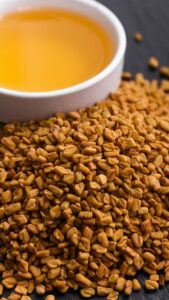
- An all-natural, secure, and tried-and-true remedy is fenugreek.
- It is free of artificial chemicals, parabens, and dangerous ingredients.
- All hair types often accept it well due to its low possibility for allergies.
- It is also incredibly affordable, biodegradable, and environmentally friendly, which makes it a perfect complement to any holistic hair care or clean beauty routine.
- How to Make a Hair Mask with Fenugreek:
- Overnight, soak two to three tablespoons of fenugreek seeds in water.
- In the morning, blend into a homogeneous paste.
- (Optional) For extra nutrition, mix with yogurt or coconut milk.
- Distribute evenly throughout the hair and scalp.
- For 30 to 45 minutes, leave it on.
- Rinse well and use a gentle shampoo to cleanse.
5. Banana – Natural Softener with Protein Traces
- In addition to being a tasty and energizing fruit, bananas are a natural hair care gem, particularly for those with damaged, frizzy, or dry hair.
- Although bananas have very little protein, they are rich in potassium, natural oils, silica, and the vital vitamins A, B6, C, and E.
- These nutrients assist to soften, hydrate, and repair hair without making it feel heavy.
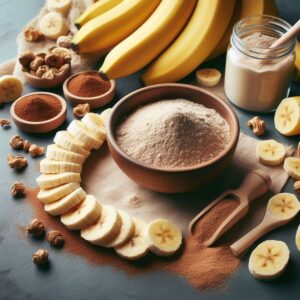
- According to hair specialists, nutrient deficiencies and moisture imbalance are the most frequent causes of frizz and hair damage.
- As a natural emollient, bananas help seal in moisture, which makes hair softer and easier to manage.
- Bananas’ silica increases the natural creation of collagen in your hair, making each strand stronger and more elastic.
- Bananas are a moderate yet powerful ingredient in any protein-rich hair mask because of their natural sugars and trace protein content, which also strengthen the hair shaft and nourish the scalp.
- After just one application, people who use bananas in their DIY hair treatments usually remark immediate softness and noticeable smoothness.
- Banana-based masks are beneficial, according to several users:
- Control flyaways and frizz.
- Add some natural gloss and sparkle.
- Over time, fix split ends.
- Bananas are particularly beneficial for people with wavy or curly hair since they keep hair moisturized and help define curl patterns.
- For a rich, spa-like treatment at home, its thick, creamy texture also makes it simple to combine with other ingredients like yogurt, honey, or olive oil.
- Despite having less protein than yogurt or eggs, bananas’ mix of vitamins and minerals, including potassium and vitamin B6, helps control oil production, restore hair suppleness, and enhance scalp health in general.
- Both anecdotal success stories and the fundamental nutritional science of bananas’ constituents support their moisturizing and softening properties.
- For those with overprocessed or heat-damaged hair, trichologists frequently suggest bananas because of their mild hydration, which helps reverse dryness without creating irritation or product accumulation.
- It also helps to lessen flakiness and dryness because of its naturally acidic pH, which is in harmony with the scalp’s natural equilibrium.
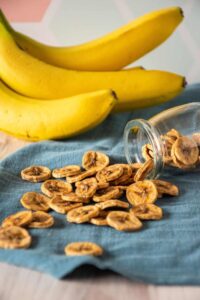
- All hair types, even color-treated or chemically processed hair, benefit greatly from bananas’ safety and non-toxicity.
- They are an affordable, natural substitute for store-bought deep conditioners, many of which include parabens or artificial silicones.
- Bananas also fit with eco-friendly cosmetic methods because they are edible and fully biodegradable.
- To prevent clumps that could be challenging to rinse off, it’s crucial to fully combine them into a homogeneous paste.
- How to Apply It:
- To create a hair mask with bananas:
- Blend or mash one ripe banana until it’s smooth.
- (Optional) For extra nutrition, stir in 1 tablespoon of yogurt or honey.
- Apply from the roots to the ends of damp hair.
- Put it on for 20 to 30 minutes.
- Use a mild shampoo and lukewarm water to rinse well.
FAQS
1. Can I use these natural protein masks on chemically treated or colored hair?
Yes, these masks are safe and nourishing for chemically treated or colored hair. Natural ingredients like yogurt, avocado, and banana help restore moisture and repair damage without stripping color.
2.How often should I apply homemade protein hair masks?
For most hair types, using a protein mask once a week is ideal. Overuse may lead to protein overload, especially for low-porosity hair.
3.Do these masks work for all hair types?
Yes, these natural ingredients are generally suitable for all hair types—curly, straight, wavy, or coily. You can customize the ingredients based on your hair needs.
4. Can I store these DIY protein masks for later use?
It’s best to use them fresh. Since they contain no preservatives, store-bought shelf life doesn’t apply. If necessary, refrigerate for up to 24 hours in an airtight container.
5. Which ingredient is best for reducing hair fall?
Fenugreek seeds are highly effective for reducing hair fall due to their high protein, lecithin, and nicotinic acid content that strengthens the hair from roots.
6. Can I mix more than one ingredient in one mask?
Absolutely! Combining ingredients like yogurt and banana or avocado and coconut milk can enhance the overall benefit and give your hair a more holistic treatment.
7. Will these masks help in hair growth?
Yes, ingredients like coconut milk and fenugreek stimulate the scalp, improve blood circulation, and encourage healthy hair growth over time.
8. Is there any risk of allergic reaction?
While rare, some people may be sensitive to certain ingredients. Always perform a patch test before full application to avoid irritation or allergic reactions.
9. Do I need to shampoo after applying a natural protein mask?
Yes, rinse thoroughly and follow with a mild, sulfate-free shampoo to remove any residue and seal in the benefits.
10. Can men use these homemade hair masks too?
Definitely! These natural remedies work for both men and women, offering deep nourishment and strength to anyone looking to improve hair health.
